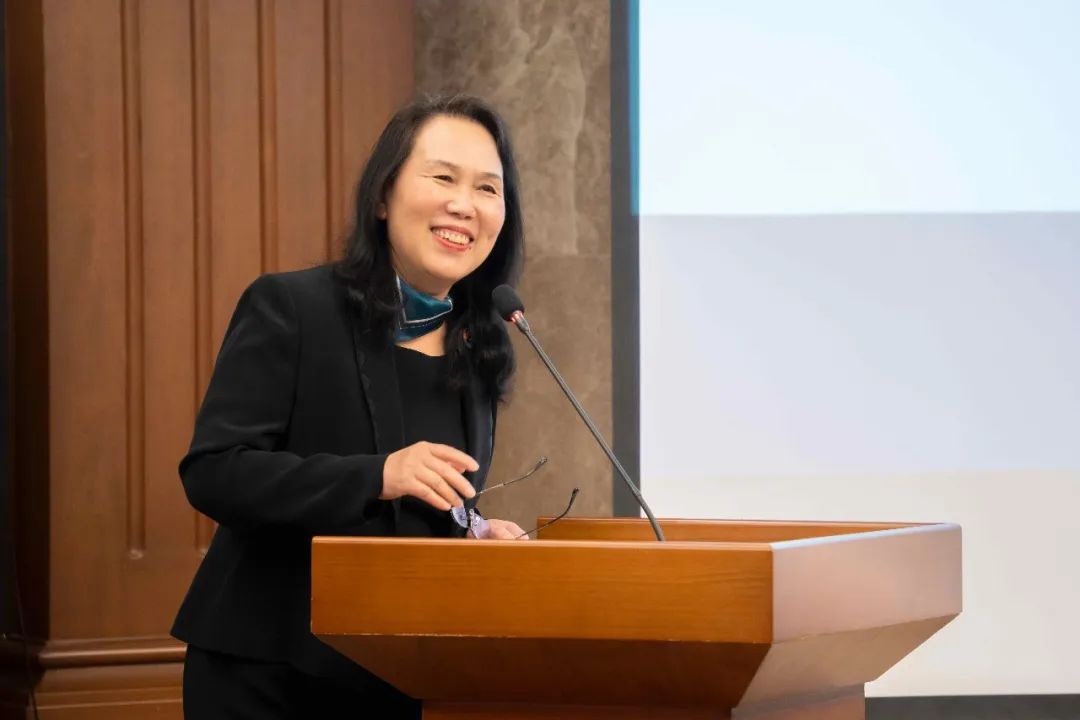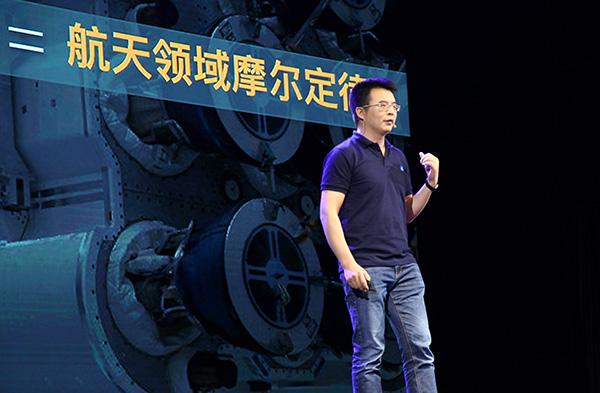The "Artificial Intelligence Ethics, Governance And Sustainable Development Forum" Was Held Online, With More Than 5,000 People Participating In The Meeting
The "Artificial Intelligence Ethics, Governance And Sustainable Development Forum" Was Held Online, With More Than 5,000 People Participating In The Meeting
【Abstract】 Recently, the
【Abstract】 Recently, the "Artificial Intelligence Ethics, Governance and Sustainable Development Forum" was successfully held. The Deputy Secretary-General of the United Nations was invited to give a keynote report on the conference. Xu Qiang, director of the Beijing Science and Technology Commission, attended and delivered a speech. More than 5,000 experts and scholars attended the conference online. The forum released the "Artificial Intelligence Think Tank for Sustainable Development" and the "Artificial Intelligence Charity Research Plan for Sustainable Development".
On June 22, the "Artificial Intelligence Ethics, Governance and Sustainable Development Forum" hosted by Zhiyuan Artificial Intelligence Ethics and Sustainable Development Center, co-organized by the China-UK Artificial Intelligence Ethics and Governance Center of the Institute of Automation of the Chinese Academy of Sciences and Megvii Technology Artificial Intelligence Governance Research Institute was successfully held. The Deputy Secretary-General of the United Nations was invited to give a keynote report on the conference. Xu Qiang, director of the Beijing Science and Technology Commission, attended and delivered a speech. About 5,300 experts and scholars from all over the world attended the conference online.
The Deputy Secretary-General of the United Nations introduced the "United Nations Digital Cooperation Roadmap" released on June 11. The primary goal of this roadmap is to "connect, respect and protect people in the digital age", achieve a sustainable and inclusive recovery in the current global COVID-19 pandemic, promote global digital cooperation to deal with the serious abuse of technology that has emerged worldwide. Its main content includes promoting universal digital connections, promoting digital technology to become a public product, ensuring that digital technology benefits everyone, supporting digital capacity building, and building digital trust and security.
In his speech, Xu Qiang, director of the Beijing Science and Technology Commission, pointed out that Beijing issued the "Beijing Consensus for Artificial Intelligence" in May 2019, providing a "Beijing Plan" to regulate and lead the healthy development of artificial intelligence. Zhiyuan Research Institute takes the lead in building a comprehensive sandbox platform for artificial intelligence risk and security, which has played an important role in realizing "self-discipline", "good governance" and "orderly" of artificial intelligence. We hope that universities, institutes, enterprises, etc. in the field of artificial intelligence in Beijing will fulfill their social responsibilities, develop "artificial intelligence for sustainable development", promote the sustainable development of the global society, economy and environment, and promote the construction and realization of a community with a shared future for mankind.
Under the joint witness of the United Nations Deputy Secretary-General and Director of the Municipal Science and Technology Commission Xu Qiang, Co-Chair of the Leading Committee of Sustainable Development Networks, Professor Xue Lan of Tsinghua University, and Dr. Kai-Fu Lee, CEO of Innovation Works, Zeng Yi, Director of the Center for Ethics and Sustainable Development Research and Researcher of the Institute of Automation, on behalf of Zhiyuan and related partners, Zeng Yi released the "Artificial Intelligence Think Tank for Sustainable Development" and the "Artificial Intelligence Public Welfare Research Plan for Sustainable Development".

The meeting invited Danit Gal, a technical consultant of the United Nations and a part-time researcher at the Center for Intelligent Future Research at the University of Cambridge, S Gill, former executive director of the high-level group for digital cooperation of the United Nations Secretary-General, Professor Lütge, Director of the Center for AI Ethics at the Technical University of Munich, Head of the Expert Group on AI Ethics and Governance in the Field of Health of the World Health Organization (WHO), Professor Effy of the Ethics University of Zurich, Switzerland, Director of AI Ethics at the Alan Turing Institute, and Member of the Special Expert Group on AI Ethics of UNESCO (UNESCO), and Co-Chair of the Robot Ethics Committee of the IEEE Society of Robots and Automation, and Professor Eindhoven University of Technology for the Conference.

Roundtable discussion on "Linking East-West AI Ethics, Governance and Sustainable Development"
The meeting also held a roundtable discussion on "Linking East-West AI Ethics, Governance and Sustainable Development". Dr. Seán ÓhÉ, Research Director of the Center for Future Intelligence Research at Cambridge University, Professor Liu Qiao, Dean of the Guanghua School of Management of Peking University, Xu Yuncheng, Dean of the Institute of Artificial Intelligence Governance of Megvii, and Dr. Wu Guobin, Director of the Ecology and Development of Didi Chuxing Technology, were invited to participate in the roundtable discussion and interact with online participants. The forum guests generally felt that global cooperation in artificial intelligence ethics and governance faced challenges, and urged the need to strengthen exchanges and innovation cooperation; the world has initially established a system of principled artificial intelligence ethics and governance, and needs to focus on implementation and application practices; the guests at the meeting unanimously acknowledged that artificial intelligence plays a huge role in achieving sustainable development around the world, but we must pay attention to the potential risks and carry out developing artificial intelligence ethics and governance work, so as to promote the realization of the global sustainable development goals through artificial intelligence.

Summary of the forum guest discussion
1. Global cooperation in artificial intelligence ethics and governance faces challenges, and it is necessary to strengthen exchanges and innovation cooperation. Strengthening artificial intelligence ethics and governance has become a global consensus. Many countries have issued policies and guiding opinions on artificial intelligence ethics and governance. However, the exchanges between the East and the West and other countries are affected by different cultures and national conditions, which are prone to misunderstandings, competition, and unfavorable for cooperation. Seán óhé, director of the Center for Future Intelligence Research at the University of Cambridge, pointed out that linguistic expressions under cultural differences are prone to unnecessary misunderstandings, deepening the gap. UN technical consultant Danit Gal believes that insufficient communication leads to misunderstandings and competition, and recommends strengthening exchanges, promoting cooperation, and advocating and inspiring global cooperation and international collaborative innovation on a global scale. Xu Yuncheng, director of the Megvii Institute of Artificial Intelligence Governance, suggested that countries use transparency to gain trust and promote cooperation through the common goals of sustainable development. Liu Qiao, dean of the Guanghua School of Management of Peking University, suggested that effective mechanisms should be established to promote discussion and consensus among stakeholders.
2. The world has initially established a system of artificial intelligence ethics and governance principles, and it is necessary to focus on application practices and pilot work. At present, different intergovernmental organizations, national and regional governments, scientific research institutions and enterprises around the world have put forward artificial intelligence (ethical) principles or related proposals at different levels. Although the principles of each company have focused on their expression, they are relatively consistent in some core contents, and a framework system of relevant principles has been initially formed. However, due to the opaque artificial intelligence technology, inconsistent evaluation standards in different regions, and unclear regulatory agencies, the principle formulation and practice of artificial intelligence in specific application fields are not closely linked to practice. Effy Vayena, professor at the ETH Zurich University of Zurich and head of the expert group for AI ethics and governance in the field of health in the World Health Organization (WHO), suggested that experts should be promoted to guide enterprises to conduct pilot demonstrations of AI development and ethical governance, and explore the establishment of data utilization and protection mechanisms for artificial intelligence technology in sensitive fields such as medical care and health.
3. Artificial intelligence plays a huge role in achieving sustainable development around the world, but we must pay attention to artificial intelligence ethics and governance. Artificial intelligence technology has played a role in sustainable development such as poverty alleviation, environmental protection, medical and health, equality and justice, social governance and security, but artificial intelligence that is not in line with ethical security may endanger society and harm humans. Lütge, director of the AI Ethics Center of the Technical University of Munich and initiator of the Global AI Ethics Association, suggested that in the process of promoting artificial intelligence to empower social development, we should pay attention to the construction of artificial intelligence ethics and strengthen artificial intelligence supervision and governance on issues such as equality, justice, privacy, and discrimination. The head of AI ethics at the Alan Turing Institute and a member of the UNESCO Special Expert Group on Artificial Intelligence Ethics suggests that when facing different groups such as races and genders, different predictive models are needed to solve potential ethical problems such as discrimination and unfairness.
4. Scientific artificial intelligence ethics and governance promote the sustainable development of high-level artificial intelligence and promote the realization of global sustainable development goals. The purpose of ethics and governance is to solve ethical issues such as fairness, equality, privacy, and discrimination. This has prompted artificial intelligence to develop in an understandable, safe, transparent, effective and responsible direction, and has become an important guarantee for promoting the realization of the global sustainable development goals. The relevant work has improved the accuracy and effectiveness of artificial intelligence while solving problems such as equality and discrimination. Professor of Eindhoven University of Technology and co-chair of the Robot Ethics Committee of the IEEE Robot and Automation Society believes that the development of artificial intelligence ethics has promoted the advancement of artificial intelligence technology. Professor Liu Qiao believes that artificial intelligence governance promotes artificial intelligence to improve its ability to deal with accidents. Xu Yuncheng believes that social sustainable development requires sustainable artificial intelligence technology, and technological sustainability is the strategic goal of enterprise development.
Wisely reveal the future and see new knowledge





